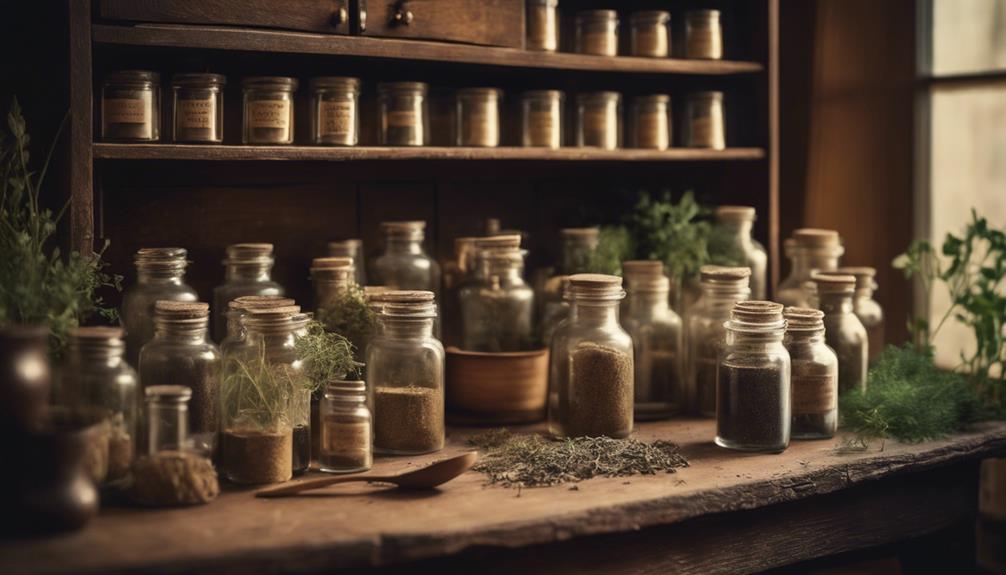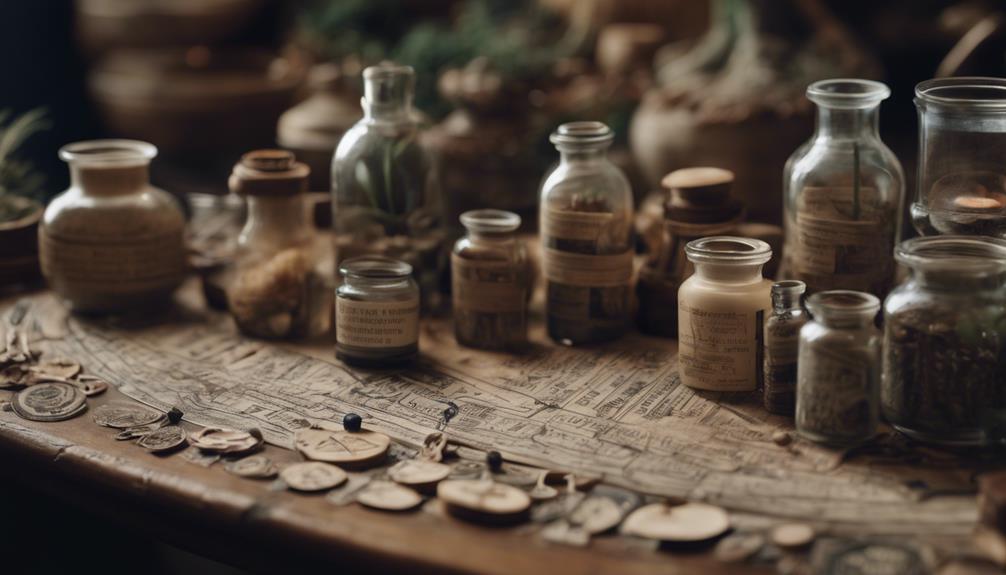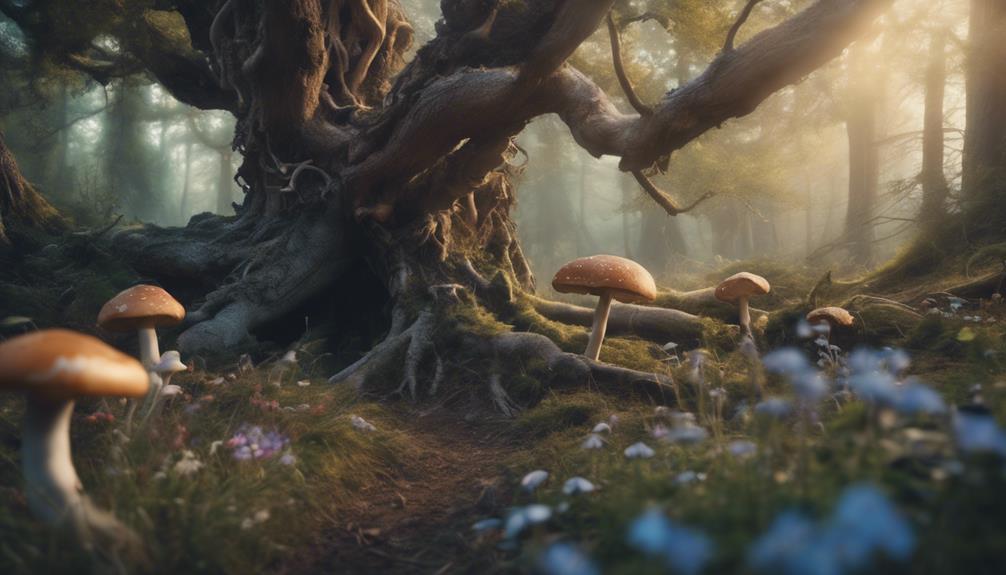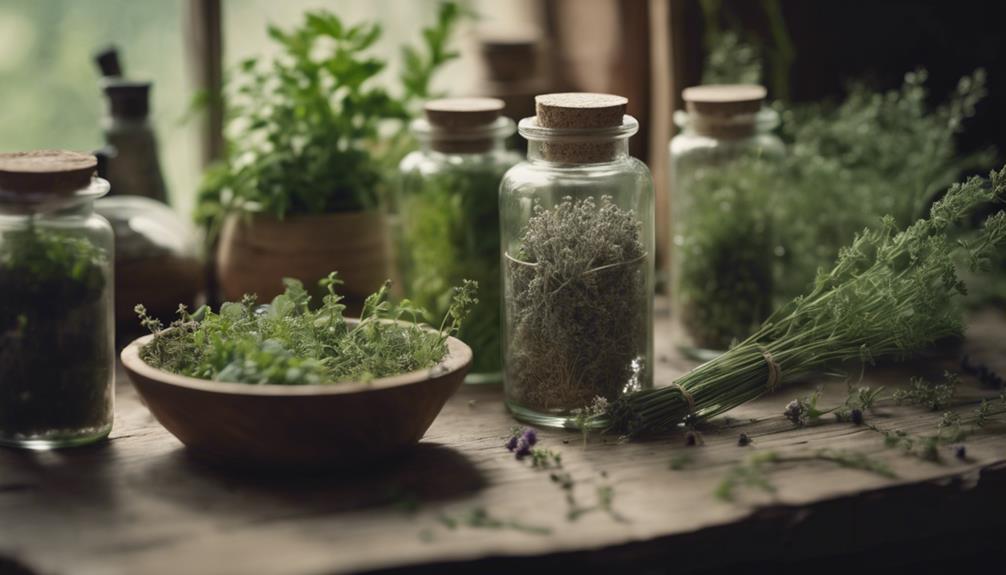As we explore the roots of folk herbalism, we uncover a rich tapestry of ancient traditions, cultural influences, and mystical threads. We find that ancient civilizations, like Mesopotamia, wove herbal remedies into daily life, believing certain plants possessed divine powers. Traditional healers relied on plants for healing and magical significance, passing down unique practices and traditions shaped by social, spiritual, and environmental aspects of their societies. From African traditional healers using devil's claw to Native American spiritual practices, each culture has its distinct approach to herbalism. As we continue on this journey, we'll discover more secrets hidden within the threads of folk herbalism.
Key Takeaways
• Folk herbalism weaves together ancient traditions from diverse cultural, spiritual, and mystical threads to create a rich tapestry of plant-based remedies.
• Ancient civilizations, like Mesopotamia, played a significant role in shaping herbal remedies as an integral part of daily life and spiritual practices.
• Traditional healers relied heavily on plants for healing, magical significance, and spiritual purposes, with certain plants believed to possess divine powers in Mesopotamia.
• Cultural traditions and bioregions have shaped unique magico-medicinal traditions and plant knowledge, influencing herb selection, rituals, and healing practices across different societies.
• Preserving traditional knowledge is crucial in folk remedies and kitchen wisdom, which emphasize using local herbs for holistic healing and stress the importance of nature in health solutions.
Unraveling Ancient Herbal Traditions
As we explore the rich tapestry of folk herbalism, we find that ancient herbal traditions have been woven from a diverse array of cultural, spiritual, and mystical threads.
Delving deeper, we discover that ancient civilizations, such as those in Mesopotamia, played a significant role in shaping these traditions. In Ancient Mesopotamia, herbal remedies were an integral part of daily life, with plants like myrrh and cedar being used for their medicinal and spiritual properties.
We see that traditional healers relied heavily on plants, not only for their healing properties but also for their magical significance. The ancient Mesopotamians, for instance, believed that certain plants possessed divine power, which they harnessed to cure ailments and ward off evil spirits.
Cultural Roots of Plant Medicine

Exploring the cultural roots of plant medicine, we find that folk herbalism is deeply intertwined with the social, spiritual, and environmental fabric of diverse societies. As we investigate the world of herbal medicine, we discover that different cultures have developed unique practices and traditions surrounding plant-based remedies.
In many cases, traditional plant medicine is closely tied to folklore, mythology, and spiritual beliefs. The cultural traditions of a community influence the selection of herbs, rituals, and healing practices in folk herbalism. For instance, the bioregion of a community can shape its unique magico-medicinal traditions and plant knowledge.
Folk herbalism reflects the interconnectedness of humans with nature, emphasizing the healing power of plants in diverse cultural contexts. By examining the cultural roots of plant medicine, we gain a deeper understanding of the complex relationships between humans, plants, and the environment.
As we explore these cultural roots, we uncover a rich tapestry of traditions and practices that highlight the significance of herbal medicine in different cultures.
Folk Remedies and Kitchen Wisdom

We explore folk remedies and kitchen wisdom, where the healing power of plants meets everyday practicality, to uncover the secrets of using locally sourced herbs and ingredients for health and wellness.
In the United States, folk herbalism has a rich history, where people have always turned to nature to address common health issues. Kitchen wisdom, passed down through generations, emphasizes the importance of using readily available resources for holistic healing practices.
We've learned that folk remedies often involve using plants and herbs found in the local environment for healing purposes. Kitchen medicine, a key aspect of folk herbalism, involves creating simple remedies from everyday ingredients to address common health issues.
By leveraging local herbal resources, we can tap into the centuries-old tradition of folk herbalism. This approach not only promotes self-sufficiency but also fosters a deeper connection with nature.
As we explore further into the world of folk remedies and kitchen wisdom, we're reminded of the significance of preserving traditional knowledge and honoring the heritage of herbalism.
Herbalism Across Cultures and Time

Across the globe, ancient civilizations have explored herbalism into the fabric of their cultures, crafting unique approaches that reflect their distinct folklore, mythologies, and historical contexts.
As we investigate the rich tapestry of herbalism, we find that different cultures have developed distinct practices, each rooted in their medicinal properties and human history.
- In Africa, traditional healers have long used plants like devil's claw to treat ailments, blending spiritual and physical healing.
- In Native American cultures, herbalism is deeply tied to spiritual practices, with plants like sage and sweetgrass used in ceremonies and rituals.
- In Europe, herbalism has evolved from ancient Greek and Roman practices, incorporating knowledge from monasteries and apothecaries.
- In rural lands, traditional herbal practices continue to thrive, with local communities relying on herbal remedies passed down through generations.
As we explore herbalism across cultures and time, we gain a deeper understanding of the interconnectedness of humanity with the natural world. By examining the diverse approaches to herbalism, we uncover the enduring relevance of traditional knowledge and its impact on human history.
Uniting Past and Present Practices

By exploring the world of folk herbalism, we find that it's not just about preserving the past, but also about embracing the present. We draw on cultural traditions to inform our healing practices, recognizing the enduring relevance of herbal knowledge.
The evolution of folk herbalism showcases the interconnectedness of nature and human health, emphasizing that our roots of herbal practices are deeply intertwined with the natural world. By uniting past and present practices, folk herbalism offers a unique approach to health and wellness.
We're not just reviving ancient remedies; we're refining them with modern insights. This synergy enables us to tap into the collective wisdom of our ancestors while harnessing the power of modern science.
As we explore the roots of folk herbalism, we're reminded that the pursuit of health and wellness is a continuous journey, one that weaves together the threads of tradition and innovation.
Frequently Asked Questions
What Is a Folk Herbalist?
We define a folk herbalist as a traditional practitioner who uses plant-based remedies and knowledge passed down through generations. They combine folklore, kitchen medicine, and community herbalism to address physical, spiritual, and emotional health.
Where Does Folk Medicine Come From?
We've discovered that a staggering 80% of the world's population relies on traditional medicine for their primary healthcare needs.
Now, let's explore the origins of folk medicine. Its roots stretch back centuries, with ancient cultures worldwide developing unique remedies based on local flora and spiritual beliefs.
From traditional Chinese medicine to Ayurvedic practices in India, folk medicine has evolved over time, shaped by the cultural, social, and environmental contexts of each community.
What Is the Oldest Medicinal Herb?
We've discovered that the oldest medicinal herb known to humans is likely Yarrow, also known as Achillea millefolium. This ancient plant has been used for its healing properties for thousands of years, with evidence of its use found in Neanderthal burial sites.
The Greeks, Romans, and Native Americans all utilized Yarrow for wound healing, fever reduction, and digestive issues, earning it a reputation as a versatile and potent healing herb.
Where Does Herbalism Originate?
We find that herbalism originates from diverse cultures worldwide, including ancient Egypt, China, and Greece. Indigenous communities have practiced herbalism for generations, passing down knowledge through oral traditions.
These ancient civilizations believed that nature provides remedies for various ailments and imbalances in the body, using plants, roots, and natural elements to heal.
Conclusion
As we conclude our exploration of folk herbalism, we're reminded that 80% of the world's population still relies on traditional plant medicine for primary healthcare. This staggering statistic highlights the significance of preserving ancient herbal traditions, honoring the cultural roots of plant medicine, and embracing the wisdom of our ancestors.
By uniting past and present practices, we can guarantee the continued relevance and importance of folk herbalism in modern times.










